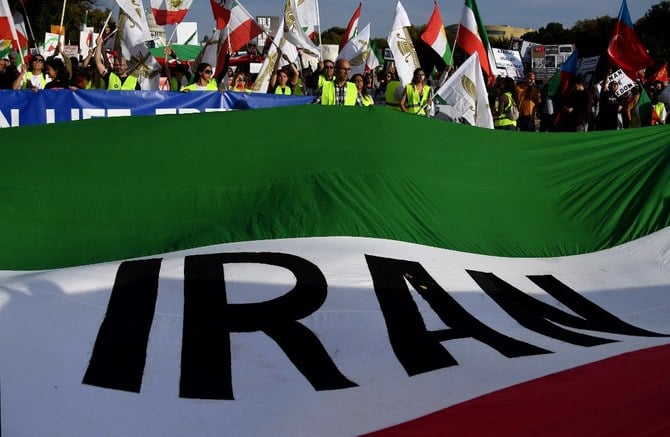
The EU still appears to be determined to pursue diplomacy with the Islamic Republic and negotiate with the Iranian leaders in order to revive the Joint Comprehensive Plan of Action nuclear deal. But this is the worst time to hold talks with the Iranian leaders and reach an agreement with the theocratic establishment for several reasons.
EU foreign policy chief Josep Borrell last month met with Iranian Foreign Minister Hossein Amir-Abdollahian in Jordan, stressing that the revival of the nuclear deal is an important step. He said, according to Mehr News: “I still believe that when it comes to nuclear nonproliferation, there is no alternative to the Joint Comprehensive Plan of Action. Those who think otherwise simply fool themselves.” He added that he would “continue working toward restoring the JCPOA based on the results of the Vienna negotiations … Bringing the JCPOA back to life does not happen in a strategic vacuum. It is part, a key part, of a broader picture.”
It is important to point out that negotiating with the Iranian leaders at this critical time is a major blow to the Iranian people. The regime continues to employ brute force to crack down on protesters. But the Iranian people have been courageously protesting against the clerical regime for nearly four months now. The uprising has spread to many cities and it appears to cut across all sectors of society, even including high school students, who are showing remarkable courage and political consciousness.
Any deal that benefits the regime will likely weaken the uprising, which has given a real sense of empowerment and optimism to the Iranian people. This has cemented the idea for many that the regime’s days are numbered and its overthrow is finally within reach.
Supreme Leader Ali Khamenei issued his boldest warning yet in a bid to intimidate the population into submission. But people in many cities, including Tehran, Karaj, Shiraz, Tabriz and Arak, defied Khamenei’s warning and took to the streets with even more ferocity than before. Images of the supreme leader were burned and the vehicles of security forces were torched. Protesters clashed with security forces in scenes that have now become normal.
The world should finally abandon a policy that has appeased the mullahs in Iran for four decades, unnecessarily extending their reign of terror
Dr. Majid Rafizadeh
By attempting to reach a deal with the Iranian leaders, the West is also sending a message that it is ignoring the regime’s brutal crackdown, as well as its abysmal human rights record. Thanks to decades of brave resistance by the Iranian people, particularly women, many in the international community are aware that these people have a legitimate right to protest against a cruel, tyrannical regime that continues to massacre its people — as it did in 1988, when 30,000 political prisoners were murdered. The world should finally abandon a policy that has appeased the mullahs in Iran for four decades, unnecessarily extending their reign of terror.
In addition, the EU should not take any action that legitimizes the Islamic Revolutionary Guard Corps’ oppression. Contrary to some narratives, the IRGC is heavily involved in the suppression of protesters. But its forces seem to be exhausted and demoralized. Recently revealed orders by the IRGC’s top brass to quickly crush the persistent protests are perhaps the best illustration that the suppressive machinery is running out of gas.
Furthermore, the EU ought to be cognizant of the fact that any nuclear deal that lifts economic sanctions against the Iranian regime will most likely empower it to continue supporting Russia in the Ukraine conflict, as well as more forcefully pursue its own military adventurism and terror activities in the Middle East. The Iranian regime continues to provide Russia with military drones, which have inflicted significant damage on Ukraine. This marks the first time that Iranian weapons have been deployed on European soil. According to the Wall Street Journal: “Russia has inflicted serious damage on Ukrainian forces with recently introduced Iranian drones, in its first wide-scale deployment of a foreign weapons system since the war began.”
While the Iranian regime and Russia are increasing their economic and military cooperation, the Iranian leaders are unfortunately seeing no adverse consequences for their actions. “When you project strength, you have peace,” US Rep. Michael McCaul pointed out in September. “When you project weakness like this, how can any country look at this performance and not think about weakness and maybe incompetence?”
In a nutshell, as the Iranian people continue to protest against tyranny, this is not the time for the West to negotiate with the Iranian leaders, reach a deal and lift sanctions against Tehran. This will only legitimize the regime’s brutal actions.
Dr. Majid Rafizadeh is a Harvard-educated Iranian-American political scientist. Twitter: @Dr_Rafizadeh









